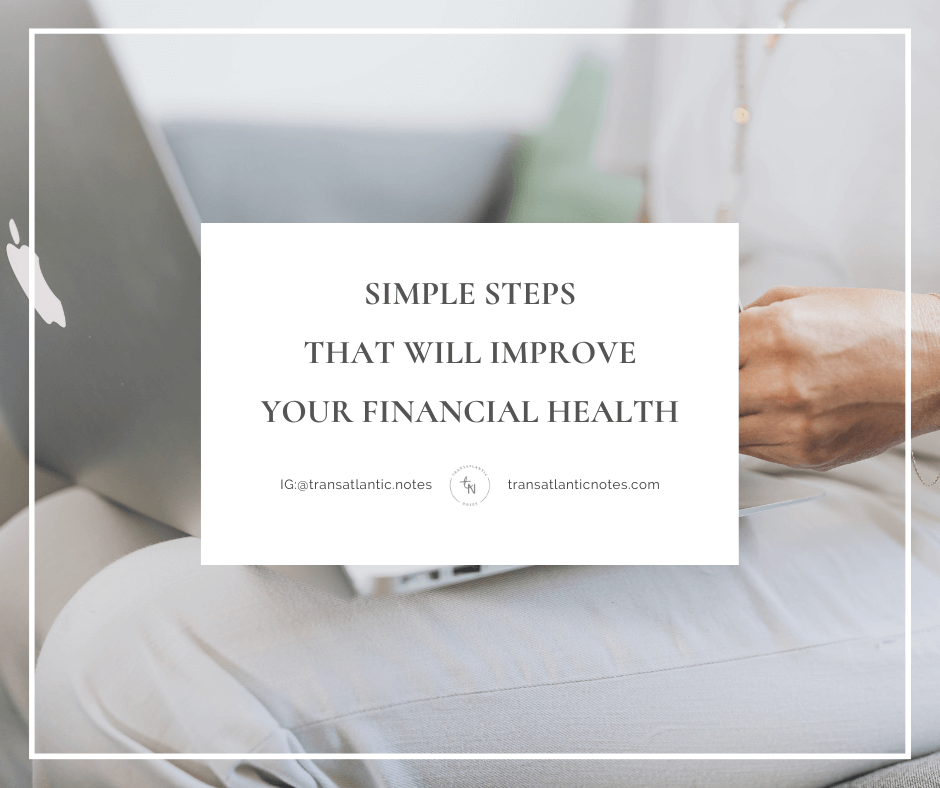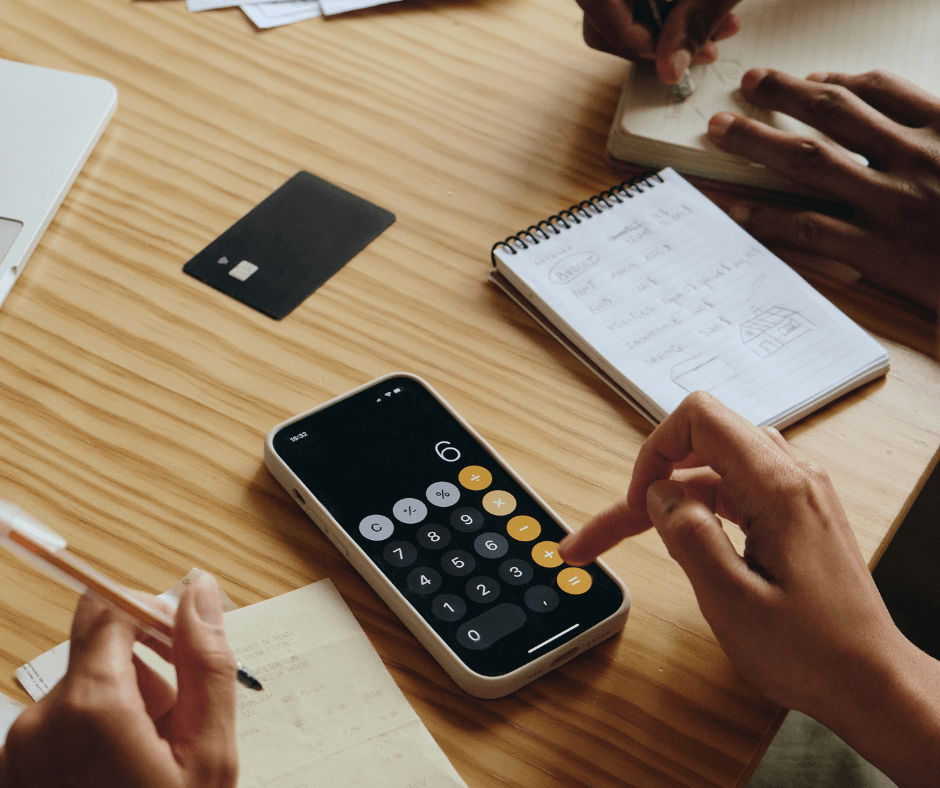Improving your financial health can sometimes seem like a daunting task or feel a bit overwhelming if you are not really sure where to begin. Identifying what can make an immediate and tangible difference will encourage and motivate you as you work to boost your finances.
Being able to enhance and maintain your financial health is crucial for a stable and fulfilling life. Satisfying your basic needs, pursuing personal aspirations, and having the ability to withstand unforeseen issues and expenses are essential for establishing your present and future security—all of which play a part in reducing stress and promoting a sense of well-being.

Much like physical and emotional health, enhancing and maintaining reliable financial habits involves a conscious effort to implement beneficial change. Wellness practices are not restricted to addressing issues related to the mind, body, and soul; what is in your bank account and wallet is just as important for nurturing your peace of mind and comfort.
The Core Fundamentals of Financial Health
Even though individual circumstances will determine what needs to be prioritised; financial well-being refers to a monetary stability that allows you to face economic challenges, accomplish financial goals, plan for the future, pursue your dreams, and enjoy life. Typically, this includes:
- Maintaining day-to-day outgoings (household bills, food, transportation, healthcare, etc.).
- Managing other expenses and/or investments.
- Covering debt obligations without causing personal hardships.
- Having an emergency fund for any unforeseen issues and some savings for other pursuits, interests, or opportunities.
- Making progress towards long-term financial objectives.
Establishing economic health will be a gradual process for many people because reshaping ingrained habits and building a stable foundation can be difficult. The successes and challenges of life frequently create obstacles or occasions where financial planning gets derailed, diminished, or completely turned on its head. Developing budgets, paying down debt, and increasing savings may not always be easy or accessible; however, it’s worth adopting some trusted practices that support working towards financial longevity, even during leaner times.
Getting organised and being aware of what resources are available to assist you can definitely help make your money work more effectively. Not long ago, I had to critically examine my own economic situation and uncover ways to invigorate it. The banking, budgeting and money-saving tips included in this article are what I found particularly useful. They may seem small, but when they are applied collectively, they can deliver noticeable benefits.

7 Simple Steps That Will Improve Your Financial Health
Not all of these suggestions are appropriate for everyone, but the great thing about these ideas is that they can be implemented immediately, and most do not require specialist knowledge or equipment (other than an internet connection and access to a secure computer).
Important Note: While embracing these practices has helped me personally, they are not included here as a replacement for financial advice from a professional. These practical pointers will not magically solve all your economic issues or fast-track budgeting goals; however, they can become part of a beneficial financial health routine.
Step One: Make Sure You Get Online Banking
Most people who have access to online banking are probably already making good use of it; but if this is something you have not set up, make it a priority to do so. Not only does it make tracking your spending nice and easy (more about that in step two), it allows you to quickly spot any issues and deal with them promptly. Additionally, online banking makes paying bills, transferring money to and from other accounts, and setting up direct deposits hassle-free.
- Healthy Habit: Every time you log on, transfer your ‘loose change’ to a savings account that you are not going to touch for a year. For example, if you have $189.26, transfer the $0.26 to a savings account. It’s not much money but at the end of twelve months, you will have some extra cash to pay a bill or put towards something else.
Step Two: Regularly Keep Track of Your Spending
Carefully look through what you spend your money on, especially the subscriptions you pay for each month. Cancel anything you do not use or that you can comfortably live without. Monitoring outgoings in this way encourages you to spot other recurring purchases that may also need to be reduced or eliminated altogether. Be honest with yourself about what you really need to spend your hard-earned cash on.
- Healthy Habit: Cancel one subscription and put the fee you would have paid each month into your savings account or use it to increase a bill payment on a credit card (see step three).
Step Three: Make Higher Repayments On Your Credit Cards
The best way to maintain good credit card health is to pay off your monthly bill in full; however, this might not be a viable option for everyone. Many people rely on covering just the minimum repayment, but there is a considerable problem with this method. Interest rates and fees will ensure this becomes an increasingly inefficient use of your money, ending up costing you more in the long run. Regardless whether you are in good standing or very close to your credit limit, paying more than the minimum, even by $5–$25 will help pay things off a bit quicker—this added amount could come from the subscription you cancelled in step two, for example.
- Healthy Habit: If you have multiple credit card accounts, prioritise taking care of the one with the highest interest rate first. Once that is completely paid off, include what would have been the monthly repayment from that card onto the next; repeat as necessary. For example, if you pay $100 a month on Card A and $80 a month on Card B; upon clearing the balance of A, you can incorporate the now available $100 onto Card B, increasing the total monthly repayment to $180.
- Bonus Healthy Habit: If circumstances allow for it, exclusively use your credit cards for necessities and purchases that can be comfortably paid off in full each month. This not only avoids accruing interest, but it also helps build a positive credit history.
Important Note: While this usage may reflect an ideal standard; there are many people experiencing unexpected or ongoing financial difficulties, like insufficient income, job losses, health concerns, and emergencies (even pandemics), that hinder this strategy. If you are experiencing this and it becomes an unmanageable hardship, consult with a financial advisor or credit counselling agency and explore your options with them. You may be able to arrange flexible payment options, negotiate a reduced payoff amount, or receive debt consolidation. What is most important is that you seek out professional support tailored to your individual needs.

Step Four: Implement Spending Habits That Are More Sustainable
Making small changes to how we manage our money can be a convenient way to shift towards a healthier financial mindset. Intentional choices can add up over time and lead to significant savings. Examine your spending habits and identify areas where you might be able to make small adjustments. This could include reducing the frequency of certain activities or finding more cost-effective alternatives.
- Healthy Habit: Instead of eating takeout meals every week, enjoy them as a treat every two weeks; brew your coffee at home instead of buying it daily; borrow books, movies, and music from the library; consider purchasing second-hand items from thrift stores, online marketplaces or garage sales—you get the idea!
Step Five: Rethink Your Last Minute Small Spending
Impulse buying—unplanned, spontaneous, and often unnecessary purchases—can end up becoming a very expensive way of wasting your own money. This is also the case with superfluous, low-priced items that regularly end up being slipped into your shopping basket because you think the addition of something under $5 is inconsequential. However, all costs like this accumulate over time and make a significant dent in your budget. You can definitely improve your finances by putting a stop to this kind of spending.
- Healthy Habit: When undertaking any kind of shopping, write a list of what you plan to buy before you go out. This will allow you to periodically review any products or items that deviate from what you intended to acquire. Anything that is nonessential or clearly a purchase being made on a whim should go back on the shelf.
- Bonus Healthy Habit: Sign up for a grocery store rewards card that offers cheaper prices on various items to its members (these are not credit cards and do not require any kind of monthly repayment). I make use of mine every week when food shopping; my previous bill, for example, came to $162.99, but because I was a rewards card member, it went down to $130.99, saving me $32.
Step Six: Make Sure You Sort and Sell Unwanted Items
Everyone has kitchen gadgets, bakeware, clothes, electronics, toys, etc. that have never been unboxed or sit gathering dust in a cupboard after one or two uses. Selling these items is not only a great way to spring clean your home; it also generates a bit of money to deposit in your savings or put towards a credit card bill. There are many online marketplace sites and apps where you can advertise your gently used or unwanted items for sale, which is a practical way to make some money while clearing out your clutter.
- Healthy Habit: Discover local secondhand stores that will buy your old DVDs, Blu-rays, CDs, and other tech-based items from you. The amount you receive will not be close to what you originally paid, but it’s money that could be put to good use.
Step Seven: Get Organised to Easily Track Your Outgoings
It does not matter whether you write everything down on a wall calendar or use a budgeting app to outline what your monthly bills are; having access to something that encourages advanced planning will support fulfilling your financial commitments. Marking due dates on any kind of visual reminder helps to streamline and manage expenses, reducing the likelihood of missed payments, late fees and financial stress.
- Healthy Habit: Take time each month to review your bills and check for any discrepancies, unexpected increases or products add-ons you no longer need. Be proactive about contacting service providers to negotiate better rates or explore options for reducing costs. This can be particularly effective for things like cable, the internet, or insurance.
In Summary
Hopefully, the straightforward yet impactful steps summarised in this article have helped to highlight how making small changes can take charge of your financial health. It’s worth reassessing how your hard-earned cash is being spent and finding ways to introduce some simple yet immensely beneficial personal finance habits and resources. Developing a secure financial future takes time, effort, and organisation—it’s a journey worth taking!
How do you incorporate budgeting into your daily routine? What strategies will you implement to build and maintain your financial health?
Further Info:
How Does Credit Card Interest Work? – Credit Karma
A Beginner’s Guide to Budgeting: 5 Steps for Getting Your Spending in Check – The Penny Hoarder



Excellent tips, Molly. I think number 2 is critical. So many people have no idea where their money is going.
LikeLike
I agree, it’s such an essential step to take!
LikeLiked by 1 person
These are useful tips. I need to take notes. Thank you for sharing.
LikeLike
These tips have really helped me and are things I will be focusing on next year too. Thanks for reading!
LikeLike
These are excellent tips for improving your financial health. I’ve been making changes to my finances this year and I’ve thankfully saved some money from doing that! x
Lucy
LikeLike
It’s great to be able to review what is and is not working for our finances and make changes where we need to. It definitely can save us a lot of money!
LikeLike
Great tips. I use a budget app which makes it so easy to review my monthly spending and see where I can improve. I rarely buy coffee (I make my own at home) but I need to do better where ordering takeout is concerned.
LikeLike
Apps can be such a great way to stay on track and monitor spending and outgoings. I like the idea that you review regularly to see where you can improve!
LikeLiked by 1 person
I love these tips, Molly! When I first moved to university, I wanted to write down all my outgoings. Now 3 years on, it is a good habit that I have kept and helps me see the unnecessary purchases to avoid in the future. I need to up my Vinted game and sell more items.
LikeLike
It’s great to get into healthy financial habits and maintain them throughout life. Anything that helps us get onto solid financial footing. Thanks for reading!
LikeLiked by 1 person
Very practical tips for enhancing financial well-being! Implementing small, impactful changes can truly make a significant difference. Cheers to a healthier financial future!
LikeLike
I found that small changes really do make a big difference; definitely worth doing!
LikeLike
This is really helpful! Excellent post.
LikeLike
Thanks so much for reading!
LikeLike
Great post! I like to keep track of my spending as then I know what’s coming in and out 🙂 thanks for sharing these tips x
LikeLike
I like to do that too as it makes everything much more manageable. Thanks for reading!
LikeLiked by 1 person
These are all wonderful ideas to help improve your financial health. I really loved your tip on transferring loose change into your savings account. Oftentimes, we stop ourselves from putting money away because it’s “not enough” but any amount is better than nothing and it definitely adds up in the long run. Thank you for sharing!
LikeLike
The loose change one has been so great, it does not produce a huge amount but at the end of the year I have a little something to use. It’s a great practice to get into using!
LikeLike
What a great post! Saving it on my reading list to revisit it in the future. I would highlight and emphasize the point about your financial well-being as a wellness practice. “Wellness practices are not restricted to addressing issues related to the mind, body and soul; what is your bank account is just as important”!!! I couldn’t agree more but I admit financial wellbeing is an area that is often overlooked when it comes to talking about wellness.
LikeLike
I often overlook it too, but if there are some changes we can start making, it gets to a point where it becomes more of a regular practice. Thanks so much for reading!
LikeLike
Working on my finances is quite a road trip but overall. I started to be a bit more cautious on how I spend.
Love your post
LikeLike
It all starts somewhere, so it’s great that you have made some changes where you can!
LikeLike
Excellent article. Working out a budget is definitelyu the starting point, without that a person is just guessing. So many people waste money on things that don’t provide much vale. You need to know your incomings and outgoings down to a tee.
LikeLike
I agree 100%! It’s amazing how much stuff we buy into or subscribe to and never use. It’s important to know exactly where our money is going.
LikeLike
I love budgeting and all things personal finance, so this post makes me so happy. I am one of those people that has a monthly ledger where I write down every transaction to track my spending and ensure every bill is paid off. I love your suggestion of transferring your “loose change” in your online bank account to your savings. That’s such a great way to save money without even really missing the money as you set it aside.
LikeLike
Me too! I am making this a focus again for 2024 as it all helps keep things on track. I feel much more secure and organized when I do things like this and can see the benefits as the year progresses!
LikeLike
Great tips Molly. I am so thankful my husband and I decided to eliminate credit card debt a few years ago. When I had to quit working due to illness, it really helped that we did not have that extra expense to worry about. I am glad we saved when we had two incomes since it has really helped us now.
LikeLike
This is what my husband and I are working on too, and it’s going to make such a difference not having that extra worry over coming repayments. If possible, saving money whenever/wherever you can is a great help. Thanks for reading!
LikeLike